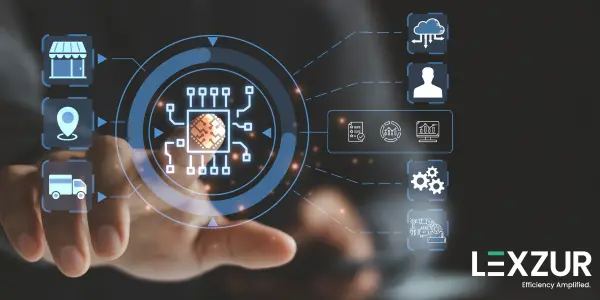As new and more innovative technology weaves its way into every other industry, it comes as no surprise that law firm management technology has become an increasingly popular topic. And that’s not solely due to the rise of the “virtual law office” either. In reality, law firms have always relied heavily upon technology and its widespread capabilities. Surprised? If you work at a law firm, you shouldn’t be.
Legal management technology has always been a priority for law firms and the lawyers, paralegals, and secretaries within them. With each new wave of technological innovation comes another opportunity for firms to consider their tech stack and how it helps their operations, including internal and external communications, legal research, data storage, file scanning and sharing, time tracking and billing, and accounting.
In other words, the traditional and precedent-obsessed suit-and-tie law industry has actually been a beacon—albeit, perhaps, not exactly a trailblazing one—of technology and its diversity of applications and capabilities.
Yes, believe it or not, law firms and technology have quite the history.
This, however, doesn’t mean partners and managing lawyers always invest in the best technology for their firms. Most people simply don’t have the time or tech knowledge required to perform a true analysis of their options. Without that upfront deep dive, law firms often select solutions that end up failing to meet their needs.
Or, they fall victim to “shiny object syndrome” (which is definitely not unique to law), which occurs when one invests sizable amounts of time and money into a multitude of fancy tech platforms and apps, each of which is designed to serve a single, uber-cool purpose. Yet, when you look at these in the context of the firm’s entire tech ecosystem, you realize that they lack any crossover or consolidation opportunities.
This causes problems—and often, these are expensive ones that could’ve been avoided.
So, in the rest of this post, you’re going to learn how to do exactly that: choose the best legal technology for your law firm, while avoiding common pitfalls and oversights.
How to choose the right technology for your law firm
With seemingly endless options for all types of tech solutions, it takes a trained eye and mind to discern the “shiny objects” from true business-building software solutions and applications.
And although it’s easy to do, investing in the wrong tech can be hard to deal with.
Here are just a few of the biggest drawbacks of choosing the wrong app or software for your practice:
It costs a lot of time, money, and effort to procure and implement new technology.
Lawyers, paralegals, and legal assistants alike simply can’t perform to the best of their ability if they’re being made to use the wrong tech.
Even if you have the right tools, too many applications and software programs can still cause confusion and frustration.
Together, these add up to the most detrimental consequence of all: a loss of trust in a firm’s leaders. And that, unfortunately, is difficult to come back from—not impossible, but difficult.
The way to avoid a suboptimal technology investment? Avoid the temptation to throw more money at a bad tool as a way to “patch” it up with new and shiny apps. Instead, put your investment from the very beginning in a functional, practical, and dependable solution.
Step 1: Identify the problems with your law firm’s current tech solutions
If you’re active in the day-to-day operations of your law firm, the problems with your current tech stack should be fairly obvious. You could have poor bandwidth, frequent outages, a lack of customization… the list of possible issues goes on and on.
But if your tech problems aren’t so obvious, then it’s important to regularly survey your lawyers and paralegals to uncover what types of obstacles could be holding them back. Maybe they need a better way to handle billable hours, or they’re looking for more flexible options for taking calls and work outside the office.
Step 2: Thoroughly research, test, and get demos of alternative software options
As with shopping for almost anything, you can’t just search for any law practice management system, or team messaging app and commit to the first thing you think is good.
Well, actually—you can do that, but when it comes to shopping for legal technology, chances are whatever you purchase and install is going to win you more headaches than cases.
To minimize the chances of that, it’s important that you assemble a lawyer technology team at your firm first: a group of the more tech-savvy lawyers is a great start—and invest a small amount of time each week to research, review, test, and demo all of your tech and software options.
Step 3: Select platforms that allow for easy app integration and tech consolidation
The best and most reliable tech solutions all have plenty of app integration and consolidation opportunities. Why? Because if you’re already using, say, Google Calendar™ or Microsoft Outlook, you can reduce a ton of manual work when it comes to scheduling meetings if your video conferencing or phone service platform has an integration with your email provider.
For example, Lexzur integrates with a wide array of applications such as Microsoft Outlook, Gmail™, DocuSign, Microsoft Teams, DrobBox, and others.
Here are the top features law firms need in their legal management solution
1- Document creation and editing software
Technology designed to help you create and edit PDFs is absolutely necessary for any law firm. The sheer number of legal documents—from contracts and affidavits to wills and non-disclosure agreements (NDA)—requires a software solution that allows you and your team of lawyers to rapidly create, update, and edit PDFs.
2- Integrated communication platform
Law firms require a robust, reliable communications system to operate effectively. Of course, a top-notch phone platform is key for client communications, but now—with the growing trend of virtual law offices and remote lawyers—integrated communications systems that allow for internal messaging and video conferencing have become exceedingly important, too. There are a lot of moving parts in every case, lawsuit, and closing, and that means a fully functioning communications system is necessary for all parties to successfully complete the work.
3. Written document creation software
Lawyers would be nothing without written documents, so it follows that a software solution for creating written documents is of supreme importance. For this type of technology, lawyers need something fast, functional, and simple. This technology has to be intuitive to use with a clear UI and UX so that all of your lawyers and paralegals can quickly and easily write legal documents.
4. File sharing and data storage platform
When it comes to sharing confidential documents with team members at your law firm, security needs to be the top priority. Beyond that, your file sharing and data storage platform should be cloud-based, which allows for a more cost-effective and faster way to store and share documents. Plus, it all but eliminates the potential for a devastating server breach or outage.
5. Timekeeping app
In an industry largely reliant on billable hours, it’s crucial that law firms have dependable and easy-to-use timekeeping tech. Not only that, but lawyers need a software solution that helps them accurately track every single minute they’re spending on client work. Otherwise, they’ll be left guessing and potentially over-or under-charging their clientele by tens of thousands of dollars per month.












Leave a Comment